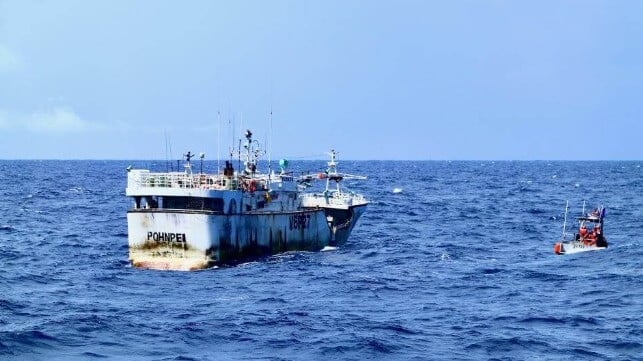U.S. Coast Guard Gets Authority to Enforce Micronesian Fisheries Laws

The U.S. Coast Guard has formalized a cooperative agreement with the Federated States of Micronesia (FSM) to conduct fisheries enforcement on its behalf, without the presence of a local official. It is the first such agreement between the Coast Guard and a sovereign Pacific island nation.
The agreement is an expansion of the Coast Guard's existing shiprider program, which allows cutter crews to work together with embarked FSM fisheries officials to conduct law enforcement boardings. The USCG has similar shiprider agreements with 11 nations in the Pacific islands, and it regularly uses these arrangements to combat illegal fishing in their EEZs.
The expanded program with FSM should speed up interdictions, according to the Coast Guard. The nation has more than 600 islands and one million square miles of EEZ to patrol, and allowing cutter crews to carry out an intercept on their own - without first diverting to embark an FSM officer - will speed up the process. After requesting and receiving approval from FSM's National Police, USCG cutter crews can now observe, board, and search vessels suspected of illicit activity in Micronesian waters.
"We frequently patrol the region with our Fast Response Cutters from Guam. Still, it can be quite a logistical undertaking to get an FSM marine police officer from Pohnpei aboard a patrol vessel in time to respond to a possible illegal fishing situation, particularly farther out in Yap or Kosrae states," said Capt. Nick Simmons, commander of U.S. Coast Guard Forces Micronesia/Sector Guam. "This agreement allows us to help our partners overcome the logistics that limited enforcement in the past when it is difficult to get a shiprider out to the field."
The experience of the COVID era also informed the agreement. During FSM's long COVID-19 border closure, U.S. Coast Guard cutters patrolling FSM's EEZ reported sightings of suspected illicit activity, but had no way to conduct a boarding: FSM's quarantine measures prevented its officials from shipriding on a cutter.
The Coast Guard has already tested out the new arrangement. On December 17, the crew of USCGC Frederick Hatch conducted two boardings on licensed fishing vessels in the FSM's EEZ with prior approval.

that matters most
Get the latest maritime news delivered to your inbox daily.
"It was very fulfilling to have an opportunity to enact the procedures under the expanded agreement for the first time after watching the program develop over the last year," said Lt. Patrick Dreiss, USCGC Frederick Hatch commanding officer. "It provides the U.S. Coast Guard with another avenue to support our regional partners and continues to lay the groundwork for increasing Illegal, Unregulated, and Unreported Fishing enforcement in the region."
FSM has a longstanding formal relationship with the U.S. government. Until 1986, it was part of the Trust Territory of the Pacific Islands, a U.S.-governed territory under a UN mandate. Through the Compact of Free Association, the U.S. still provides for FSM's national defense, and most FSM citizens have the right to live and work in the United States.
